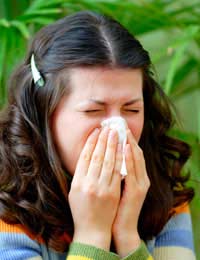What Are 'Antihistamines' and How Do They Work?

Antihistamines are a common over-the-counter medication that many people keep on hand in their medicine cabinet. They are mainly used to treat allergic symptoms resulting from conditions such as hay fever or poison ivy rashes. Many people find their allergies worsen during certain times of the year known as the 'allergy season.' This coincides with the increase in tree and grass pollen and depending on where you live it is usually during the warmer months.
How Do Antihistamines Work?
Antihistamines function to block the release of a chemical called histamine, which is one of your body's natural defences. When your body recognises a foreign substance, also called an allergen, it reacts defensively through a sequence of reactions leading to the release of various chemicals, one of which is histamine. These constitute your body's allergic response to the allergen. Itching is one of the responses to the allergen and it can range from mild to extremely uncomfortable and painful.Antihistamines work to:
- Alleviate red and irritated eyes
- Reduce a runny nose and sneezing
- Ease itching in the throat, nose or eyes
Types of Antihistamines
There are numerous different antihistamines available over-the-counter and through a prescription. They also come in a variety of formats. They may be:- Creams
- Tablets
- Ointments
- Eye drops
- Nasal drops
The older antihistamines are known as first generation antihistamines and these tend to cause a strong drowsy effect. The newer ones, known as second generation antihistamines, are less likely to leave you drowsy and work particularly well to ease daytime allergy symptoms. Obviously it's important to ensure you take a daytime formula if you are partaking in any activity that requires you to remain alert. Night-time formulas will make you drowsy but this can be quite helpful to give you a good night's rest and relief from your symptoms. Depending on how long the effects last, however, some people may find they wake up still feeling somewhat drowsy. Under no circumstances should you take a night-time formula and then drive. Both the older and newer antihistamines are effective but the newer ones tend to be slightly more expensive.
Some of the common antihistamines you will find in the ingredient labels of drugs supplied by your pharmacy include:
- Acrivastine
- Loratadine
- Fexofenadine
- Desloratidine
- Cetirizine
- Neoclarityn
- Benadryl
- Boots antihistamine tablets
- Zirtek
Extra Cautions
Prolonged use of antihistamines can leave your nasal membranes dry and irritated so it's a good idea to have your doctor monitor your allergies and any treatment. Very rarely antihistamines can cause an irregular heartbeat. As always, be aware of the possible effects on concentration, not only when driving but in situations where you need a sharp focus, such as sitting through a school exam.When it comes to managing everyday ailments such as allergies and certain skin rashes, antihistamines are a useful medication to have in your medicine cabinet. If you suffer from frequent allergies, it's best to ensure you have an adequate supply of antihistamines in your home and that you take them under your doctor's advice. You can hopefully enjoy the warmer months without the pesky runny nose, itchy throat and watery eyes that plague allergy sufferers.
Business Energy With a Difference
If you are looking for business energy or need advanced solutions like remote energy monitoring, new supplies, downgrading or upgrading capacity, have a no obligation chat with Purely Energy.
To find our more get in touch here. or call 0161 521 3400.







